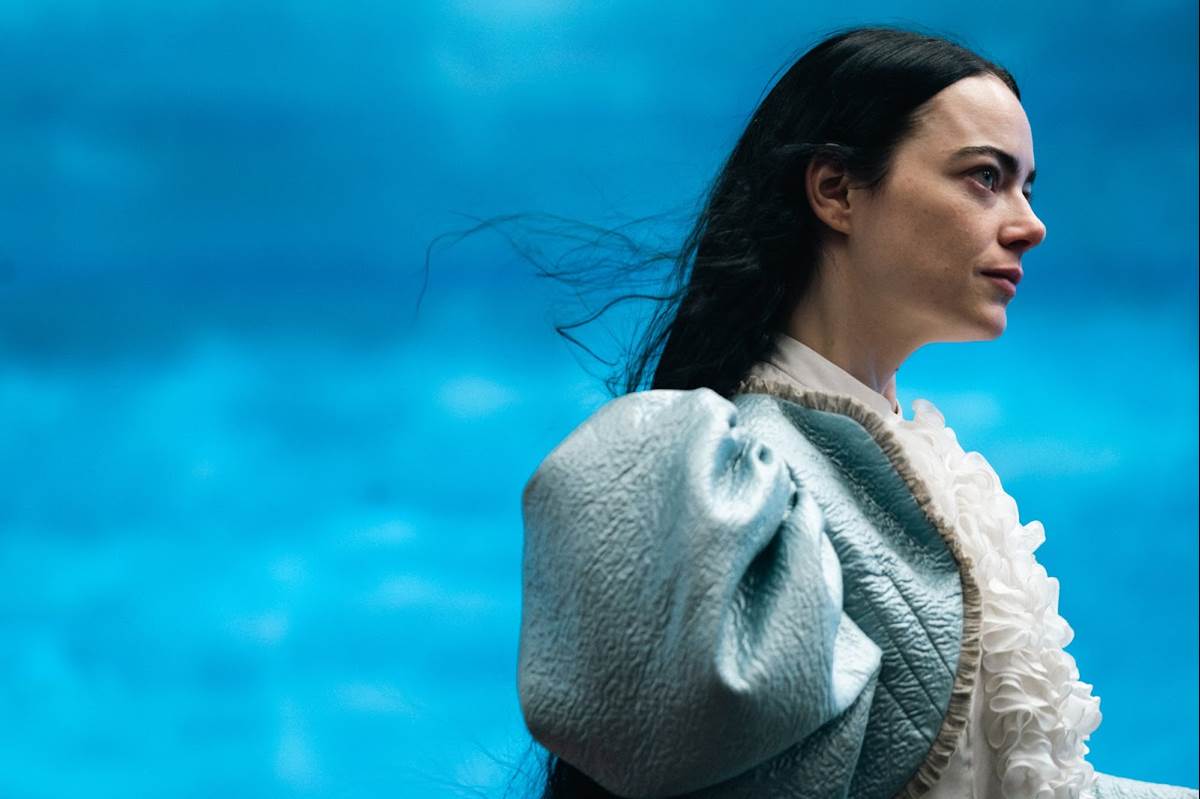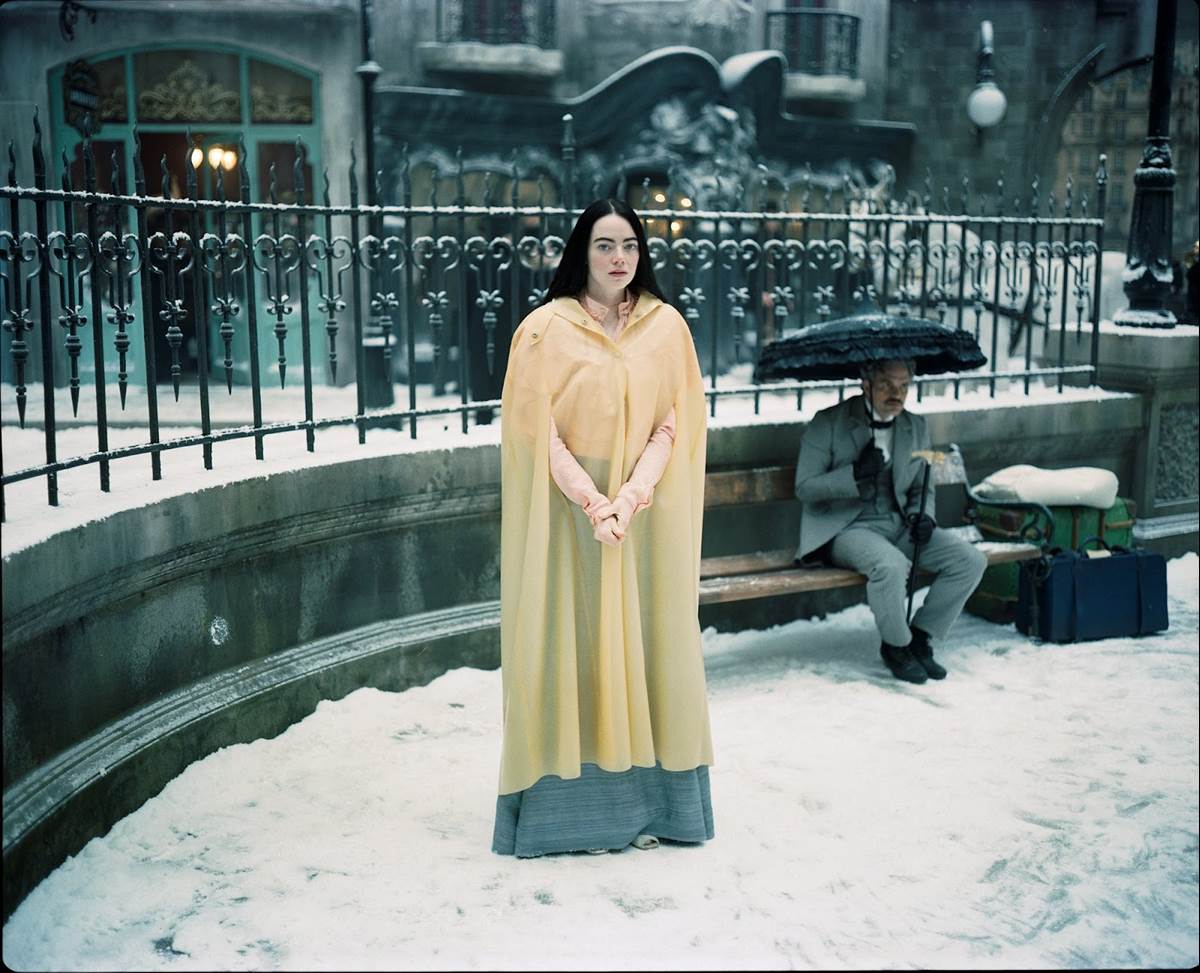Already an award-winner through the festival circuit, Searchlight Pictures’ Poor Things ushers in awards season with a limited theatrical release on December 8th, followed by a broader rollout on December 22nd. From the writer, director, and star of the Oscar-winning comedy, The Favourite, comes another tale of feminism, one far more twisted and unhinged than I was prepared for. I wasn’t familiar with the 1992 novel by Alasdair Gray that inspired the film, but Poor Things draws a lot of comparisons to Mary Shelley’s Frankenstein, Victorian fantasy tales like Lewis Carol’s Alice in Wonderland and L. Frank Baum’s The Wonderful Wizard of Oz, and 1980s dark fantasy films, including adaptations of those same stories.
When reclusive experimental scientist Godwin Baxter (Willem Dafoe, The French Dispatch) takes on pupil Max McCandless (Ramy Youssef, Ramy), his latest creation, Bella Baxter (Emma Stone, Cruella), suddenly gets a window into a world she’s never seen. Bella’s body may be that of a fully grown woman, but her transplanted brain comes from an infant. Developing fast, Max marvels at Bella’s cognitive growth in a controlled environment. But her environment will soon be less constant with the arrival of devilish lawyer Duncan Wedderburn (Mark Ruffalo, She-Hulk: Attorney at Law), who whisks Bella away into a world she has no frame of reference for.
Director Yorgos Lanthimos depicts a fantasy Victorian world for Bella to navigate, full of strange and peculiar characters that help shape her into the woman she becomes. It’s ultimately a transformative story for Bella, who goes from perfectly naive innocent to empowered feminist by the end of the journey. Like The Hunchback of Notre Dame, the most monstrous characters often feel the most human, while the most pure tend to be responsible for the greatest horrors. And like The Wizard of Oz, Bella learns a little bit from each character before realizing where she belongs is where her journey began, a predictable outcome.
Poor Things is sure to be a winner with the art-house crowd but is too offputting for popularity with the masses. The story has a well-timed message about misogyny and double standards, and the film presents a unique thought experiment about nurturing a child in an adult body. However, it’s often intentionally grotesque. Willem Dafoe’s character spends his days in his operating lab full of cadavers, with lots of surgical moments designed to make viewers squeamish. Clinical nudity is paired with grandiose sex scenes that end up feeling too shocking to be funny, although that was clearly the intent. And the runtime stretches uncomfortably past the 2-hour mark, with lots of languid lulls that felt emotionally unnecessary.
I predict that Poor Things will rack up quite a few Oscar nominations and even some wins. The performances are winning across the board, with Emma Stone captivating audiences as Bella and Mark Ruffalo proving delicious in a nefarious part. Production designers James Price and Shona Heath went above and beyond with the designs of the world, supported by Holly Waddington’s costumes and hair, makeup, and prosthetics by Nadia Stacey. Cinematographer Robbie Ryan is also a shoo-in for a gold trophy with an approach that mixes black and white, color, and Ektachrome (the black-and-white/color aspect gives Poor Things another connection to The Wizard of Oz).
Made with technical brilliance, I found myself appreciating the depth of talent across the board in Poor Things. I connected with the message, but the medical scenes repeatedly triggered my vasovagal syncope, and the perverse elements, while occasionally funny, mostly felt like crossing a line for the sake of it. Like Baxter’s work, Poor Things is well-made, and it technically works, but your soul has a lot of work to do when the credits start to roll. Also, the use of the R-slur in a fantasy film was a choice in 2023.
I give Poor Things 3 out of 5 stars.
Poor Things opens in select cities on December 8th and expands to more theaters on December 22nd.


